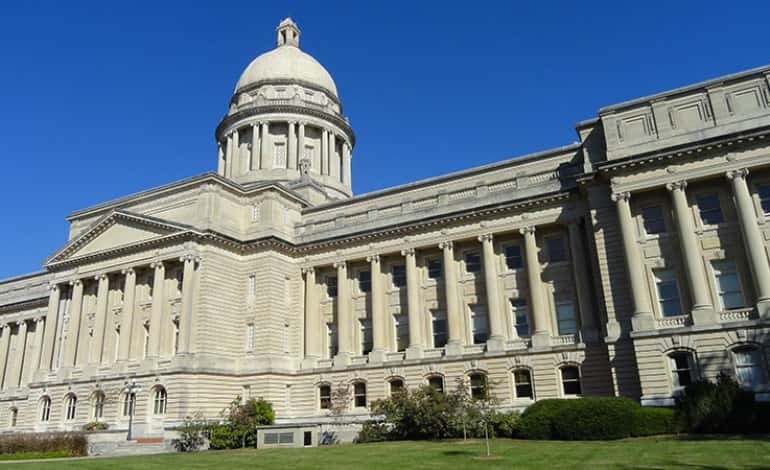 FRANKFORT – Kentucky Secretary of State Michael Adams gave a state legislative panel today an idea of how November’s general election might look amid the ongoing COVID-19 pandemic.
FRANKFORT – Kentucky Secretary of State Michael Adams gave a state legislative panel today an idea of how November’s general election might look amid the ongoing COVID-19 pandemic.
“First, our primary election was a nationally-recognized success,” Adams said while testifying before the Interim Joint Committee on State Government. “With all the things Kentucky is at the bottom of in so many areas, today we are No. 1 in something. We had the highest turnout we have seen in many years. Most important, we kept people safe.”
While November’s plan is still being drafted, Adams said he envisions it consisting of a combination of some absentee voting; early, in-person voting; and voting on Election Day. He said he is concerned expanding absentee voting, to the extent it was done for the May primary, could overwhelm county clerks and the U.S. Postal Service. Adams said he is more comfortable with having early, in-person voting to relieve potential crowds at polls on Election Day.
“Early voting worked,” Adams said. “Our county clerks are split on whether we should expand absentee voting in November, but they universally support in-person, early voting to help smooth out the number of voters over a period of weeks, rather than one day. This is a far less expensive and labor-intensive way to conduct an election.”
Rep. Joe Graviss, D-Versailles, asked how much it will cost to hold the November election in the safest and most-efficient manner.
Adams said the state spent two-thirds of the Coronavirus Aid, Relief and Economic Security (CARES) Act money it received for elections on May’s primary. He said that left only $2.5 million of CARES Act money for the November general election unless Congress approves additional funds.
“Let’s be clear, this is the most expensive election Kentucky has ever had,” Adams said of the primary.
He said it traditionally costs between $10 million and $11 million to hold general elections in Kentucky. Adams said COVID-19 precautions would increase that cost for the upcoming general election, but he could not name a price until the added precautions had been agreed upon. He then said that mail-in voting is the most expensive voting model.
Rep. James Tipton, R-Taylorsville, said counties needed flexibility and gave an example of how Anderson County offered drive-thru voting. Adams agreed and added that Hopkins County had mobile voting trucks.
Adams said the No. 1 complaint he received after the primary was a lack of polling locations on Election Day. He said he was exploring ways to combat that for the November election including creating a formula requiring a minimum number of polling locations based on a county’s population and geography. Adams added that there have to be enough poll workers to operate the polls.
In response to a comment from Rep. Jerry T. Miller, R-Louisville, Adams said he would like to see counties offer Saturday hours for early, in-person voting.
Senate Majority Floor Leader Damon Thayer, R-Georgetown, said he wasn’t “a fan” of early voting. He said that type of voting does not favor insurgent candidacies, underfunded candidates or less-known candidates.
“Campaigns are meant to peak on Election Day,” he said. “Everyone in this room has run elections, and the information that our campaigns share with voters is meant to peak on Election Day.”
Rep. Jason Nemes, R-Louisville, said the legislature shouldn’t be a bystander in deciding how Kentucky’s elections are conducted. He then requested the governor call a special session of the General Assembly to reform Kentucky’s election laws.
In response to a question from Minority Caucus Chair Rep. Derrick Graham, D-Frankfort, Adams said he would be glad to return to the committee to update them on the November election plans.
“I’m happy to talk with anybody about it, but the longer, more bureaucratic we make the process, the later and later it is going to run,” Adams said of the time it is taking to finalize a November election plan.
Sen. Christian McDaniel, R-Taylor Mill, asked Adams to appear before the September meeting of the combined House and Senate Appropriations & Revenue (A&R) Committee to testify about the costs of the upcoming election. He added that he wanted to ensure Kentucky has the necessary money to hold the election.
“The fundamental obligation we have as lawmakers is public safety and secondarily is ensuring we have safe, fair and honest elections because that is the underpinning of the entire system,” said McDaniel, the chair of the Senate A&R Committee. “That is the starting point of democracy.”
